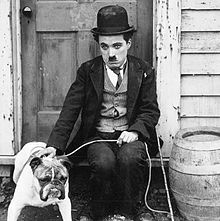Genre is any form or type of communication in any mode with socially-agreed-upon conventions developed over time. In popular usage, it normally describes a category of literature, music, or other forms of art or entertainment, whether written or spoken, audio or visual, based on some set of stylistic criteria. Genres can be aesthetic, rhetorical, communicative, or functional. Genres form by conventions that change over time as cultures invent new genres and discontinue the use of old ones. Often, works fit into multiple genres by way of borrowing and recombining these conventions. Stand-alone texts, works, or pieces of communication may have individual styles, but genres are amalgams of these texts based on agreed-upon or socially inferred conventions. Some genres may have rigid, strictly adhered-to guidelines, while others may show great flexibility.
Greek literature dates back from the ancient Greek literature, beginning in 800 BC, to the modern Greek literature of today.
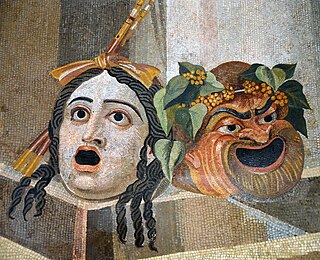
Tragicomedy is a literary genre that blends aspects of both tragic and comic forms. Most often seen in dramatic literature, the term can describe either a tragic play which contains enough comic elements to lighten the overall mood or a serious play with a happy ending. Tragicomedy, as its name implies, invokes the intended response of both the tragedy and the comedy in the audience, the former being a genre based on human suffering that invokes an accompanying catharsis and the latter being a genre intended to be humorous or amusing by inducing laughter.
Aristotle's Poetics is the earliest surviving work of Greek dramatic theory and the first extant philosophical treatise to focus on literary theory. In this text Aristotle offers an account of ποιητική, which refers to poetry and more literally "the poetic art," deriving from the term for "poet; author; maker," ποιητής. Aristotle divides the art of poetry into verse drama, lyric poetry, and epic. The genres all share the function of mimesis, or imitation of life, but differ in three ways that Aristotle describes:
- Differences in music rhythm, harmony, meter, and melody.
- Difference of goodness in the characters.
- Difference in how the narrative is presented: telling a story or acting it out.

The Dionysia was a large festival in ancient Athens in honor of the god Dionysus, the central events of which were the theatrical performances of dramatic tragedies and, from 487 BC, comedies. It was the second-most important festival after the Panathenaia. The Dionysia actually consisted of two related festivals, the Rural Dionysia and the City Dionysia, which took place in different parts of the year. They were also an essential part of the Dionysian Mysteries.
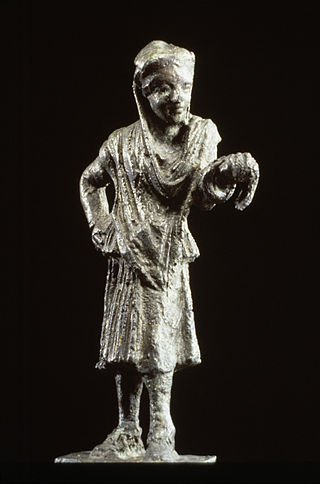
Ancient Greek theatre was a theatrical culture that flourished in ancient Greece from 700 BC. The city-state of Athens, which became a significant cultural, political, and religious place during this period, was its centre, where the theatre was institutionalised as part of a festival called the Dionysia, which honoured the god Dionysus. Tragedy, comedy, and the satyr play were the three dramatic genres to emerge there. Athens exported the festival to its numerous colonies. Modern Western theatre comes, in large measure, from the theatre of ancient Greece, from which it borrows technical terminology, classification into genres, and many of its themes, stock characters, and plot elements.

Epicharmus of Kos or Epicharmus Comicus or Epicharmus Comicus Syracusanus, thought to have lived between c. 550 and c. 460 BC, was a Greek dramatist and philosopher who is often credited with being one of the first comic writers, having originated the Doric or Sicilian comedic form.
In English literature, the term comedy of manners describes a genre of realistic, satirical comedy of the Restoration period (1660–1710) that questions and comments upon the manners and social conventions of a greatly sophisticated, artificial society. The satire of fashion, manners, and outlook on life of the social classes, is realised with stock characters, such as the braggart soldier of Ancient Greek comedy, and the fop and the rake of English Restoration comedy. The clever plot of a comedy of manners is secondary to the social commentary thematically presented through the witty dialogue of the characters, e.g. The Importance of Being Earnest (1895), by Oscar Wilde, which satirises the sexual hypocrisies of Victorian morality.

Ancient Greek comedy was one of the final three principal dramatic forms in the theatre of classical Greece. Athenian comedy is conventionally divided into three periods: Old Comedy, Middle Comedy, and New Comedy. Old Comedy survives today largely in the form of the eleven surviving plays of Aristophanes; Middle Comedy is largely lost, i.e. preserved only in relatively short fragments by authors such as Athenaeus of Naucratis; and New Comedy is known primarily from the substantial papyrus fragments of Menander.
Old Comedy (archaia) is the first period of the ancient Greek comedy, according to the canonical division by the Alexandrian grammarians. The most important Old Comic playwright is Aristophanes – whose works, with their daring political commentary and abundance of sexual innuendo, effectively and by 'de facto' define the genre today. It is important to note that the only extant plays of Old Comedy are credited to Aristophanes. There are only fragments and 'testimonia' of all other Old Comedy playwrights and plays.
Surreal humor is a form of humor predicated on deliberate violations of causal reasoning, thus producing events and behaviors that are obviously illogical. Portrayals of surreal humour tend to involve bizarre juxtapositions, incongruity, non-sequiturs, irrational or absurd situations, and expressions of nonsense.
Agon is a Greek term for a conflict, struggle or contest. This could be a contest in athletics, in chariot or horse racing, or in music or literature at a public festival in ancient Greece. Agon is the word-forming element in 'agony', explaining the concept of agon(y) in tragedy by its fundamental characters, the protagonist and antagonist.

Alazṓn is one of three stock characters in comedy of the theatre of ancient Greece. He is the opponent of the eirôn. The alazṓn is an impostor that sees himself as greater than he actually is. The senex iratus and the miles gloriosus are two types of alazṓn.
There are many theories of humor which attempt to explain what humor is, what social functions it serves, and what would be considered humorous. Among the prevailing types of theories that attempt to account for the existence of humor, there are psychological theories, the vast majority of which consider humor to be very healthy behavior; there are spiritual theories, which consider humor to be an inexplicable mystery, very much like a mystical experience. Although various classical theories of humor and laughter may be found, in contemporary academic literature, three theories of humor appear repeatedly: relief theory, superiority theory, and incongruity theory. Among current humor researchers, there is no consensus about which of these three theories of humor is most viable. Proponents of each one originally claimed their theory to be capable of explaining all cases of humor. However, they now acknowledge that although each theory generally covers its own area of focus, many instances of humor can be explained by more than one theory. Similarly, one view holds that theories have a combinative effect; Jeroen Vandaele claims that incongruity and superiority theories describe complementary mechanisms which together create humor.

Drama is the specific mode of fiction represented in performance: a play, opera, mime, ballet, etc., performed in a theatre, or on radio or television. Considered as a genre of poetry in general, the dramatic mode has been contrasted with the epic and the lyrical modes ever since Aristotle's Poetics —the earliest work of dramatic theory.
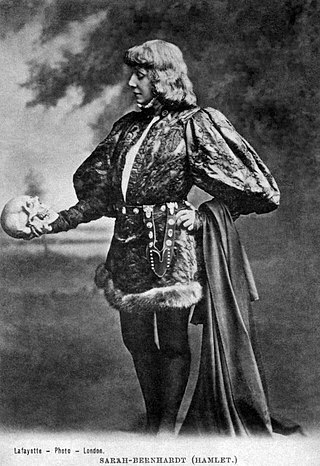
Theatre or theater is a collaborative form of performing art that uses live performers, usually actors or actresses, to present the experience of a real or imagined event before a live audience in a specific place, often a stage. The performers may communicate this experience to the audience through combinations of gesture, speech, song, music, and dance. It is the oldest form of drama, though live theatre has now been joined by modern recorded forms. Elements of art, such as painted scenery and stagecraft such as lighting are used to enhance the physicality, presence and immediacy of the experience. Places, normally buildings, where performances regularly take place are also called "theatres", as derived from the Ancient Greek θέατρον, itself from θεάομαι.

Comedy is a genre of fiction that consists of discourses or works intended to be humorous or amusing by inducing laughter, especially in theatre, film, stand-up comedy, television, radio, books, or any other entertainment medium. The term originated in ancient Greece: In Athenian democracy, the public opinion of voters was influenced by political satire performed by comic poets in theaters. The theatrical genre of Greek comedy can be described as a dramatic performance pitting two groups, ages, genders, or societies against each other in an amusing agon or conflict. Northrop Frye depicted these two opposing sides as a "Society of Youth" and a "Society of the Old". A revised view characterizes the essential agon of comedy as a struggle between a relatively powerless youth and the societal conventions posing obstacles to his hopes. In this struggle, the youth then becomes constrained by his lack of social authority, and is left with little choice but to resort to ruses which engender dramatic irony, which provokes laughter.
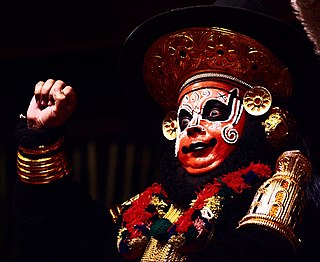
The history of theatre charts the development of theatre over the past 2,500 years. While performative elements are present in every society, it is customary to acknowledge a distinction between theatre as an art form and entertainment, and theatrical or performative elements in other activities. The history of theatre is primarily concerned with the origin and subsequent development of the theatre as an autonomous activity. Since classical Athens in the 5th century BC, vibrant traditions of theatre have flourished in cultures across the world.
To be ridiculous is to be something which is highly incongruous or inferior, sometimes deliberately so to make people laugh or get their attention, and sometimes unintendedly so as to be considered laughable and earn or provoke ridicule and derision. It comes from the 1540s Latin "ridiculosus" meaning "laughable", from "ridiculus" meaning "that which excites laughter", and from "ridere" meaning "to laugh". "Ridiculous" is an adjective describing "the ridiculous".

The theatre of Italy originates from the Middle Ages, with its background dating back to the times of the ancient Greek colonies of Magna Graecia, in Southern Italy, the theatre of the Italic peoples and the theatre of ancient Rome. It can therefore be assumed that there were two main lines of which the ancient Italian theatre developed in the Middle Ages. The first, consisting of the dramatization of Catholic liturgies and of which more documentation is retained, and the second, formed by pagan forms of spectacle such as the staging for city festivals, the court preparations of the jesters and the songs of the troubadours.
